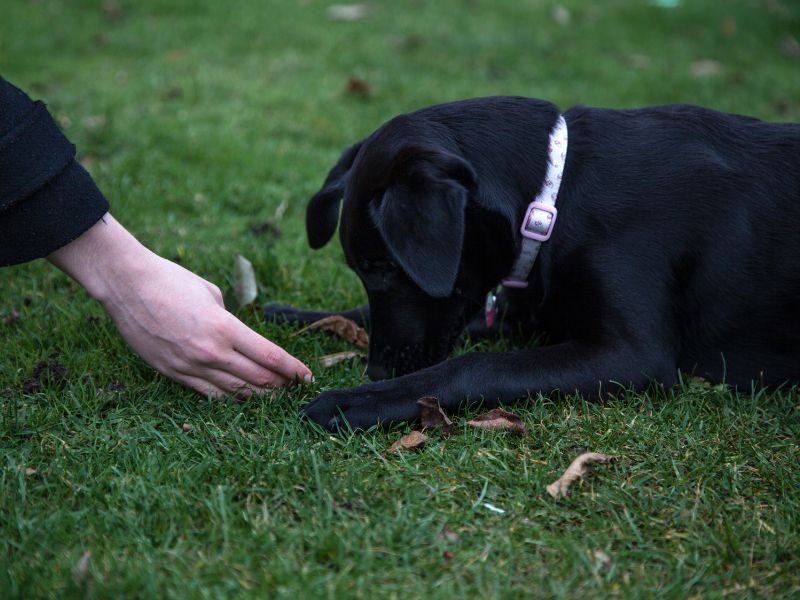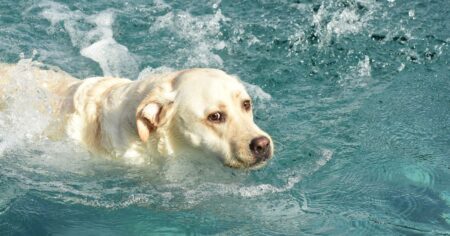Labrador Retrievers are one of the most popular dog breeds in the world. They are known for their friendly and loyal personalities, as well as their intelligence and trainability. But is a Labrador the right dog for you?
Before deciding to bring a Labrador into your home, there are several factors to consider. These include the breed’s exercise needs, size, and temperament. It’s important to ensure that a Labrador’s needs align with your lifestyle and living situation. For example, if you live in a small apartment and don’t have access to a yard, a Labrador may not be the best fit for you.
Additionally, it’s important to consider the amount of time and effort required to properly train and care for a Labrador. While they are intelligent and trainable, they do require consistent exercise and mental stimulation to prevent destructive behavior. With careful consideration and preparation, a Labrador can make a wonderful addition to any family.
Are You Ready For A Labrador?
If you’re considering getting a Labrador, there are a few things to consider before making the commitment. Labradors are known for their friendly and outgoing personalities, but they also require a lot of time, attention, and exercise.
Firstly, Labradors are high-energy dogs that require daily exercise. They enjoy running, swimming, and playing fetch, so it’s important to have a yard or access to a park where they can burn off their energy. Without enough exercise, Labradors can become bored and destructive.
Secondly, Labradors are social animals that thrive on human interaction. They love being around people and are great family pets. However, they can become anxious or destructive if left alone for long periods of time. If you work long hours or travel frequently, a Labrador may not be the best choice for you.
Thirdly, Labradors shed a lot. They have a double coat that requires regular brushing to keep it healthy and shiny. If you or anyone in your household has allergies, a Labrador may not be the best choice for you.
Lastly, Labradors are intelligent dogs that require mental stimulation. They enjoy learning new tricks and tasks, so training is important. A well-trained Labrador is a joy to be around, but an untrained one can be a handful.
Overall, if you have the time, energy, and resources to care for a Labrador, they can make wonderful pets. However, it’s important to consider their needs and temperament before bringing one into your home.
How Much Exercise Do Labradors Need?
Labradors are known for their high energy levels and playful nature. They are a breed that requires regular exercise to maintain their physical and mental well-being. According to Labrador Training HQ, a healthy adult Labrador requires at least 1 hour of exercise per day. However, the amount of exercise needed can vary depending on the individual dog’s health, size, and energy level.
It is important to note that exercise does not just mean going for a walk. Labradors are highly active and require a variety of activities to keep them engaged. This can include running, swimming, playing fetch, and other games that involve physical activity. It is also recommended to provide mental stimulation through training exercises and interactive toys.
It is essential to tailor the exercise routine to the individual dog’s needs. Over-exercising can lead to joint and muscle problems, while under-exercising can lead to obesity and other health issues. Therefore, it is important to consult with a veterinarian to determine the appropriate exercise routine for your Labrador.
In summary, Labradors require a significant amount of exercise to maintain their physical and mental health. The exercise routine should be tailored to the individual dog’s needs and include a variety of activities to keep them engaged. Consultation with a veterinarian is recommended to determine the appropriate exercise routine for your Labrador.
How Much Training Do Labradors Need?
Labradors are intelligent dogs that love to please their owners. They are eager to learn new things and have a natural desire to retrieve things. Training a Labrador is an important aspect of owning one.
A Labrador puppy needs to be trained from an early age. They are like sponges, soaking up everything they learn. Basic obedience training such as sit, stay, come, and heel are essential for a well-behaved dog. Training should be done with positive reinforcement, such as treats, praise, and toys.
In addition to basic obedience training, Labradors also benefit from more advanced training such as retrieving, agility, and hunting. Retrieving is a natural instinct for Labradors, and they love to play fetch. Agility training helps keep Labradors physically fit and mentally stimulated. Hunting training is also an option for those who plan to take their Labradors on hunting trips.
Training should be done in short sessions, around 10-15 minutes, several times a day. Consistency is key, and owners should be patient and persistent. Labradors are eager to please their owners, and training can be a fun bonding experience for both the dog and owner.
Overall, Labradors require a moderate amount of training to keep them mentally and physically stimulated. Basic obedience training is essential, and more advanced training is optional but highly recommended. With patience, consistency, and positive reinforcement, Labradors can be well-behaved and obedient companions.
How Much Attention Do Labradors Need?
Labradors are known for their friendly and affectionate nature, and they require a lot of attention from their owners. They are social animals and thrive on human interaction. Therefore, if you are considering getting a Labrador, it is important to be prepared to give them the attention they need.
Exercise Needs
Labradors are energetic dogs and require plenty of exercise to stay healthy and happy. According to HowToAnimal, on average, a Labrador should get at least 1 to 2 hours of exercise per day, depending on their age, fitness level, and individual needs. Regular exercise helps maintain your Lab’s physical health and prevents boredom and destructive behaviors. Daily walks should be brisk and at least 30 minutes long.
Mental Stimulation
In addition to physical exercise, Labradors need mental stimulation to keep them engaged. They are intelligent dogs and require mental challenges to keep their minds active. Interactive toys and puzzles can help keep your Labrador entertained and mentally stimulated.
Affection and Attention
Labradors are affectionate dogs and require plenty of attention from their owners. They thrive on human interaction and need to feel loved and cared for. Spending time with your Labrador, playing with them, and giving them affection are all important for their well-being.
In summary, Labradors require a lot of attention due to their social and affectionate nature, need for mental and physical stimulation, as well as behavioral tendencies. If you are willing to give them the attention they need, they can make great pets for families and individuals alike.
Can A Labrador Be Left Alone All Day?
Labradors are known for being friendly, sociable, and active dogs. They love spending time with their owners and thrive on human interaction. However, there may be times when you need to leave your Labrador alone at home for a few hours. The question is, can a Labrador be left alone all day?
According to various sources, including The Labrador Site and The German Shepherd, most well-adjusted adult Labradors can tolerate being left alone for 6 to 8 hours, occasionally. However, it is important to note that leaving your dog alone for extended periods can lead to separation anxiety, which can cause destructive behavior and other health problems.
To prevent separation anxiety, it is recommended to limit your time apart from your Labrador to no more than 3-4 hours. If you need to leave your dog alone for longer periods, alternatives such as boarding or hiring a dog walker should be considered.
When leaving your Labrador alone, it is essential to ensure that they have access to clean water and food. It is also important to provide them with toys and other forms of entertainment to keep them occupied and prevent boredom.
In conclusion, while Labradors can be left alone for short periods, leaving them alone all day is not recommended. It is essential to consider your dog’s needs and well-being before leaving them alone for extended periods.
Do Labradors Chew A Lot?
Labradors are known for their friendly and playful personality, but they are also notorious chewers. They have a strong urge to chew, which can lead to destructive behavior if not managed properly. There are several reasons why Labradors chew a lot, and understanding these reasons can help owners manage their chewing habits.
One reason why Labradors chew a lot is because of their teething and exploration phase. Puppies explore the world around them with their mouths, and chewing helps ease the discomfort of teething. It is important to provide appropriate chew toys to redirect their chewing behavior and protect household items.
Another reason why Labradors chew a lot is because of stress and anxiety. Labradors are social animals and can become anxious when left alone for long periods. Chewing can be a coping mechanism to relieve stress and anxiety. Providing mental stimulation and exercise can help reduce their anxiety and prevent destructive chewing.
Boredom and lack of exercise can also lead to excessive chewing in Labradors. These dogs are energetic and require daily exercise and mental stimulation. Providing regular exercise and interactive toys can help reduce their boredom and prevent destructive chewing.
In summary, Labradors have a natural urge to chew, but excessive chewing can lead to destructive behavior. Understanding the reasons why Labradors chew a lot and providing appropriate chew toys, mental stimulation, exercise, and attention can help manage their chewing habits.
Can Labradors Live In Small Houses?
Labradors are known for their friendly, outgoing, and energetic personalities. They are also one of the most popular dog breeds in the world. However, many people wonder if Labradors can live in small houses. The answer is yes, but there are some things to consider before bringing a Labrador into a small home.
Exercise and Playtime
Labradors are active dogs that require a lot of exercise and playtime. They need to run, jump, and play to burn off their energy. If a Labrador is not given enough exercise and playtime, they can become destructive and develop behavioral problems. Therefore, it is important to ensure that there is enough space for a Labrador to play and exercise in a small house. Taking them for long walks, playing fetch, and providing them with toys can help keep them active.
Socialization
Labradors are social dogs that love to be around people and other animals. They need to be socialized from a young age to prevent them from becoming anxious or aggressive. Socialization involves exposing them to different people, animals, and environments. This can be challenging in a small house, but it is still possible. Taking them to the park, inviting friends over, and enrolling them in obedience classes can help socialize them.
Training
Labradors are intelligent dogs that are easy to train. They respond well to positive reinforcement and can learn a variety of commands and tricks. Training can help prevent behavioral problems and make them easier to live with in a small house. Consistency, patience, and positive reinforcement are key to successful training.
Conclusion
In conclusion, Labradors can live in small houses as long as they are given enough exercise, playtime, socialization, and training. It is important to consider their needs and make sure that they are happy and healthy in a small home. With the right care and attention, a Labrador can be a great companion for anyone, regardless of the size of their home.
Do Labradors Need A Garden?
Labradors are known for their love of outdoor activities, and many people wonder if they need a garden to be happy. While having a garden can be beneficial for a Labrador, it is not a requirement. Labradors can adapt to living in apartments or houses without gardens, as long as their exercise needs are met.
Labradors require a lot of exercise, and this can be achieved through daily walks, runs, or visits to the park. If you live in a house without a garden, you can take your Labrador for a walk or run around the neighborhood. It is important to note that Labradors should not be left alone in a house or apartment for long periods of time, as they can become bored and destructive.
If you have a garden, it can provide an excellent space for your Labrador to play and explore. Labradors love to dig, so it is important to provide them with an area where they can do so without damaging your garden. You can also create an obstacle course or set up toys for your Labrador to play with in the garden.
In summary, while having a garden can be beneficial for a Labrador, it is not a requirement. As long as their exercise needs are met, Labradors can adapt to living in apartments or houses without gardens. However, if you do have a garden, it can provide an excellent space for your Labrador to play and explore.
Do Labradors Damage Gardens?
Labradors are known for their playful and energetic nature, which can sometimes lead to unwanted behaviors like digging and chewing. However, with proper training and exercise, Labradors can be great pets without causing any damage to your garden.
To prevent your Labrador from digging up your garden, it is important to provide them with plenty of exercise and mental stimulation. A tired dog is less likely to engage in destructive behaviors. You can also create a designated digging area for your Labrador, where they can satisfy their natural instinct to dig without causing any harm to your garden.
Another way to protect your garden from your Labrador is by using physical barriers such as fences or garden covers. This can help keep your dog out of your garden beds and prevent them from trampling on your plants.
It is also important to supervise your Labrador when they are in the garden and redirect their attention if they start to show signs of destructive behavior. Consistent training and positive reinforcement can go a long way in preventing your Labrador from damaging your garden.
Overall, while Labradors may have a tendency to dig and chew, with proper training and exercise, they can be great pets without causing any damage to your garden.
Get Pippa’s Training Tips!
If you’re considering getting a Labrador, you’ll want to make sure you have the right tools to train them properly. Pippa Mattinson is a renowned dog trainer, and her website The Labrador Site offers a wealth of information on training your furry friend.
Pippa’s training tips cover a wide range of useful topics, from specifics like heel work and recall, to general tips on getting your dog’s attention, avoiding mistakes, motivating yourself and your dog, and setting yourself up to succeed. The tips are completely free, and you can opt out at any time.
One of the most important things to remember when training a Labrador is consistency. These dogs are intelligent and eager to please, but they can also be stubborn. By following Pippa’s training tips, you’ll be well on your way to having a well-behaved and happy companion.
Another important aspect of training a Labrador is exercise. These dogs have a lot of energy, and they need plenty of opportunities to burn it off. Pippa offers tips on how to keep your dog active and engaged, whether through walks, games, or other activities.
Overall, Pippa’s training tips are an invaluable resource for anyone considering getting a Labrador. By following her advice, you’ll be setting yourself up for success and ensuring that your furry friend is happy, healthy, and well-behaved.
Your usage limit has been exceeded. Please buy a plan to get more credits 😄 Also, our Black Friday sale is active now! You can get up to 45% off credit packs.
















